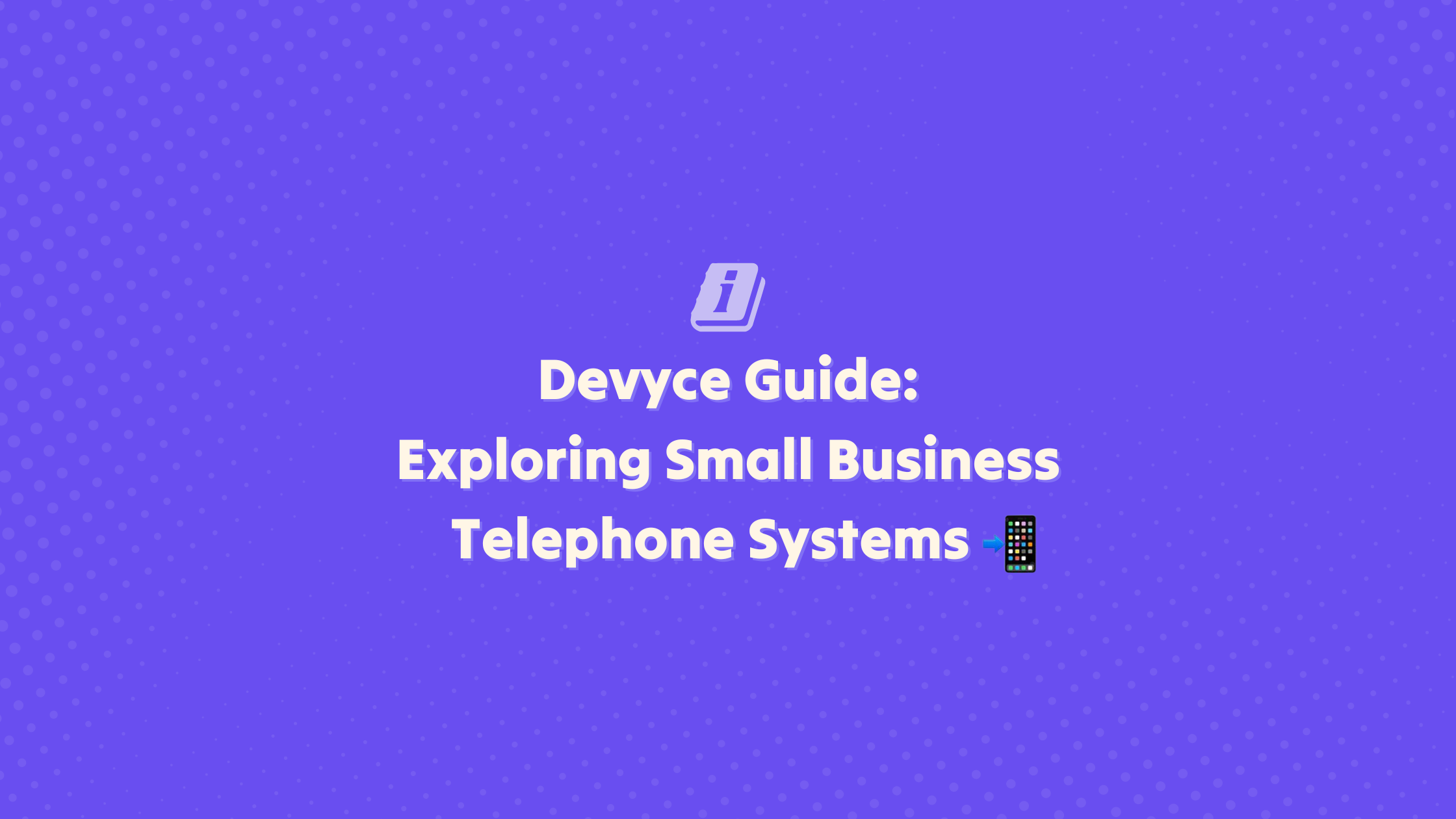Phone Systems for Small Business Explained
| By Kim Hoang | 0 Comments

Key Takeaways
- Setting up a business phone system early on is crucial for long term business growth and success
- A reliable telephone system enables effective communication within the organisation and with customers
- The three main types of small business phone systems are traditional PBX systems, virtual PBX systems, and virtual mobile phone systems
- Important factors to consider when choosing a business phone system include: business needs, scalability, budget, and system features
What are you currently using for your communications as a small business? Most small business owners and employees are likely to be using either their own phones or a second phone. While these options may be helpful in the early stages of growing your business, establishing a business communications system early on will set up your business for long term success
Why Small Businesses Need Phone Systems
Small businesses often don’t consider their business communications needs until they have expanded substantially. However, small businesses need telephone systems from the get go for several reasons. A reliable telephone system enables effective communication both within the organisation and with external stakeholders. Employees can easily connect with one another, boosting productivity and improving collaboration. Additionally, small businesses often rely on direct interaction with customers. Having a dedicated telephone system ensures that potential customers can reach the business easily. This improves customer service and increases the retention rate of customers.
Telephone systems offer advanced features like voicemail, call forwarding, and automated attendants. These streamline business operations and provide professional and efficient customer experiences. Furthermore, telephone systems enable small businesses to project a more established and credible image, as you can have a dedicated business phone number and set up professional greetings.
A robust telephone system is an essential tool for small businesses to facilitate effective communication, enhance customer service, and contribute to the growth and success of the organisation.
Types of Small Business Telephone Systems
There are three main types of business telephone systems suitable for small businesses:
- Traditional PBX (Public Branch Exchange) – These are traditional phone systems often known as ‘office phones’. They rely on landline technology and require hardware to be installed on-site. However, do bear in mind there is a landline shut-off taking place which will see landline technology becoming obsolete by 2025.
- Virtual PBX – These are similar to traditional PBX systems however, they utilise VoIP (Voice over Internet Protocol) technology. Calls are transmitted over an internet connection and the system is hosted in a cloud network, meaning there’s no need for the installation of landlines
- Virtual Phone Systems – These leverage mobile phones and phone service providers for business purposes. It’s a flexible solution as employees are able to use a mobile device and work from anywhere as long as they have an internet connection.
Factors to Consider When Choosing a Phone System for Your Small Business
Before choosing to set up a specific telephone system for your small business, here are the important factors to consider:
- Business Needs: Assess your specific communication requirements. Consider the number of employees, the volume of calls, the need for advanced features like voicemail or conferencing, and any specific integration needs with other business tools.
- Scalability: Evaluate the scalability of the system. Determine if it can accommodate future growth, additional phone lines, and extensions without significant hardware or infrastructure changes.
- Budget: Set a budget and consider the total cost of ownership, including installation, equipment, ongoing maintenance, and monthly service fees. Compare different pricing models such as upfront costs or subscription-based pricing.
- System Features: Identify the essential features your business requires, such as call forwarding, voicemail, auto-attendant, call recording, mobile integration, and integration with other business tools like CRM or email systems. Ensure that the phone system offers the necessary features to meet your specific needs.
- Deployment Options: Consider the deployment options available, such as on-site, cloud-based, or hybrid systems. Which one works for you depends on whether you have an office/physical store location or whether your employees are working remotely/hybrid. Evaluate the pros and cons of each option in terms of flexibility, maintenance requirements, and accessibility.
- Reliability and Call Quality: Look for a phone system that provides reliable service and excellent call quality. Downtime or poor call quality can negatively impact your business’s operations and customer experience. Do this by thoroughly researching different providers and their customer reviews.
- Support and Maintenance: Assess the level of support and maintenance provided by the phone system provider. Consider factors such as customer support availability, response times, and the provider’s reputation for reliability and customer service.
- Integration Capabilities: Determine if the phone system can integrate with other communication tools and business systems you use, such as CRM software, email platforms, or collaboration tools. Integration can enhance productivity and streamline workflows.
- Security and Compliance: Consider the security measures implemented by the phone system provider to protect your business’s communication data. Ensure that the system complies with relevant data privacy and security regulations.
- User-Friendliness: Evaluate the ease of use and user interface of the phone system. A user-friendly system can minimise training time and maximise productivity.
Popular Small Business Phone Systems in the UK
Traditional PBX system
For traditional PBX systems, the best options are to contact one of the big phone service providers in the UK eg. BT, Vodafone, and Sky. Due to the landline switch-off, some providers may not be issuing new traditional PBX system contracts. Therefore, it’s important to check with each provider whether they’re still issuing landline phone systems. Also, keep in mind that should you choose to set up a traditional PBX system for your business, you’ll need to switch over to a VoIP phone system by 2025 or port the number to a virtual business phone system.
VoIP phone system
The big phone service providers in the UK may also offer VoIP systems to businesses. This is due to the impending landline switch off. Large phone service providers are therefore switching existing customers or offering new business customers alternatives to traditional PBX systems.
Alternatively you could check out VoIP providers like bOnline or 8×8. They offer VoIP with desk phone capability as well as a host of advanced call features. However do be sure to thoroughly consider the pricing and what features you have access to with each plan. Many VoIP providers also only offer a certain number of outbound minutes per month and require you to upgrade your package or pay extra fees for more minutes. Therefore it’s important to consider your usage requirements and thoroughly research the pricing of VoIP providers.
Virtual Phone Systems
A popular virtual phone system used by SMEs in the UK is Devyce. Designed with flexibility and scalability in mind, the phone system is perfect for growing businesses and those with hybrid/remote working models. Devyce works by using a data/wifi connection to facilitate business calls and texts through an app. This removes the need for any hardware ie. second phones. Therefore employees can work from anywhere and on the go.
Devyce offers flexible subscription plans meaning you’re not locked into lengthy annual contracts. You are welcome to leave the service at any time. Devyce Teams is a great business phone solution for businesses as you have access to a Teams Management portal where you can manage all your team’s business communications by setting up features such as call grouping. It also allows you to monitor your team’s workflow and access their voicemail inboxes. This ensures you’ll never miss a customer call and greatly improve customer satisfaction.
Conclusion
Whether it be a traditional landline system, a Voice over Internet Protocol (VoIP) solution, or a virtual phone service, each option brings its own set of advantages and limitations. By considering factors such as budget, scalability, features, and customer support, you can make an informed decision that empowers your business with reliable and efficient communication capabilities. Embracing the right telephone system will not only enhance your internal and external communication but also contribute to the overall growth and success of your small business.
Interested in our virtual phone system? Get a 3-day free trial today!
